巴西历史概览英文
- 格式:ppt
- 大小:2.86 MB
- 文档页数:20
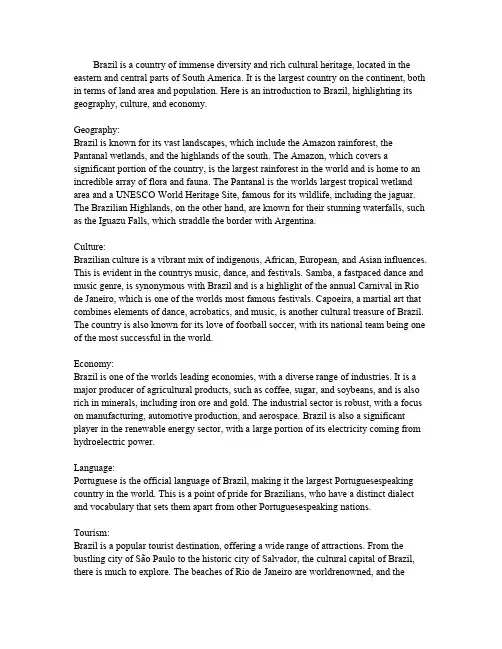
Brazil is a country of immense diversity and rich cultural heritage,located in the eastern and central parts of South America.It is the largest country on the continent,both in terms of land area and population.Here is an introduction to Brazil,highlighting its geography,culture,and economy.Geography:Brazil is known for its vast landscapes,which include the Amazon rainforest,the Pantanal wetlands,and the highlands of the south.The Amazon,which covers a significant portion of the country,is the largest rainforest in the world and is home to an incredible array of flora and fauna.The Pantanal is the worlds largest tropical wetland area and a UNESCO World Heritage Site,famous for its wildlife,including the jaguar. The Brazilian Highlands,on the other hand,are known for their stunning waterfalls,such as the Iguazu Falls,which straddle the border with Argentina.Culture:Brazilian culture is a vibrant mix of indigenous,African,European,and Asian influences. This is evident in the countrys music,dance,and festivals.Samba,a fastpaced dance and music genre,is synonymous with Brazil and is a highlight of the annual Carnival in Rio de Janeiro,which is one of the worlds most famous festivals.Capoeira,a martial art that combines elements of dance,acrobatics,and music,is another cultural treasure of Brazil. The country is also known for its love of football soccer,with its national team being one of the most successful in the world.Economy:Brazil is one of the worlds leading economies,with a diverse range of industries.It is a major producer of agricultural products,such as coffee,sugar,and soybeans,and is also rich in minerals,including iron ore and gold.The industrial sector is robust,with a focus on manufacturing,automotive production,and aerospace.Brazil is also a significant player in the renewable energy sector,with a large portion of its electricity coming from hydroelectric power.Language:Portuguese is the official language of Brazil,making it the largest Portuguesespeaking country in the world.This is a point of pride for Brazilians,who have a distinct dialect and vocabulary that sets them apart from other Portuguesespeaking nations. Tourism:Brazil is a popular tourist destination,offering a wide range of attractions.From the bustling city of São Paulo to the historic city of Salvador,the cultural capital of Brazil, there is much to explore.The beaches of Rio de Janeiro are worldrenowned,and thecountrys national parks,such as the Fernando de Noronha archipelago,offer pristine natural beauty.In conclusion,Brazil is a country of contrasts and a land of opportunity.Its rich history, diverse culture,and natural beauty make it a fascinating place to visit and learn about. Whether youre interested in exploring the Amazon,experiencing the thrill of a football match,or simply enjoying the warmth of the Brazilian people,there is something for everyone in this South American giant.。
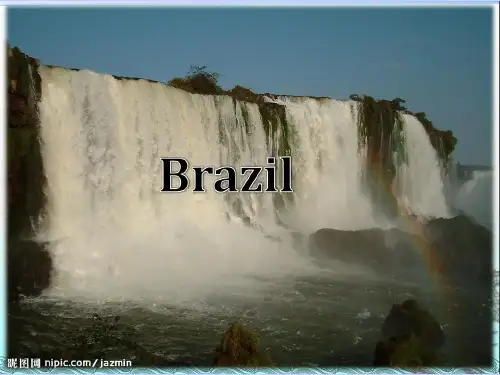
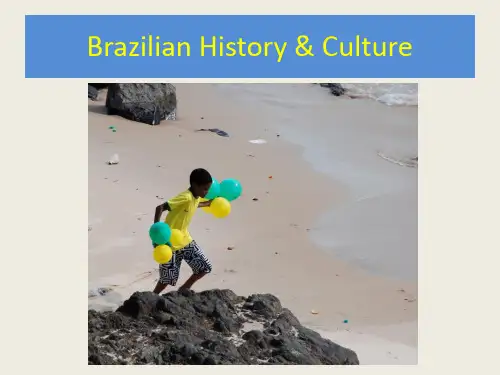
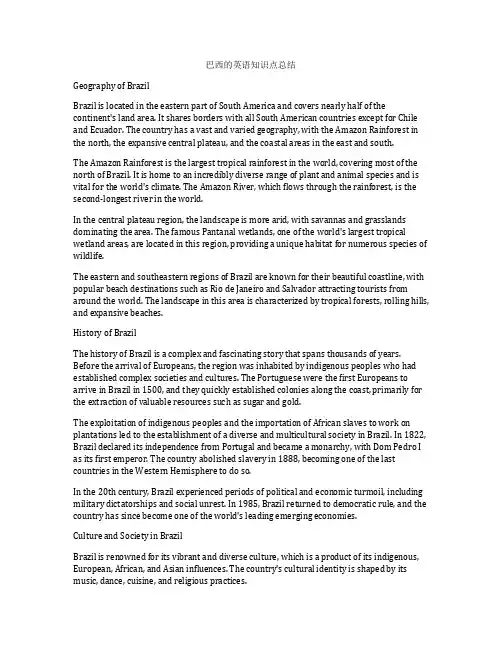
巴西的英语知识点总结Geography of BrazilBrazil is located in the eastern part of South America and covers nearly half of the continent's land area. It shares borders with all South American countries except for Chile and Ecuador. The country has a vast and varied geography, with the Amazon Rainforest in the north, the expansive central plateau, and the coastal areas in the east and south.The Amazon Rainforest is the largest tropical rainforest in the world, covering most of the north of Brazil. It is home to an incredibly diverse range of plant and animal species and is vital for the world's climate. The Amazon River, which flows through the rainforest, is the second-longest river in the world.In the central plateau region, the landscape is more arid, with savannas and grasslands dominating the area. The famous Pantanal wetlands, one of the world's largest tropical wetland areas, are located in this region, providing a unique habitat for numerous species of wildlife.The eastern and southeastern regions of Brazil are known for their beautiful coastline, with popular beach destinations such as Rio de Janeiro and Salvador attracting tourists from around the world. The landscape in this area is characterized by tropical forests, rolling hills, and expansive beaches.History of BrazilThe history of Brazil is a complex and fascinating story that spans thousands of years. Before the arrival of Europeans, the region was inhabited by indigenous peoples who had established complex societies and cultures. The Portuguese were the first Europeans to arrive in Brazil in 1500, and they quickly established colonies along the coast, primarily for the extraction of valuable resources such as sugar and gold.The exploitation of indigenous peoples and the importation of African slaves to work on plantations led to the establishment of a diverse and multicultural society in Brazil. In 1822, Brazil declared its independence from Portugal and became a monarchy, with Dom Pedro I as its first emperor. The country abolished slavery in 1888, becoming one of the last countries in the Western Hemisphere to do so.In the 20th century, Brazil experienced periods of political and economic turmoil, including military dictatorships and social unrest. In 1985, Brazil returned to democratic rule, and the country has since become one of the world's leading emerging economies.Culture and Society in BrazilBrazil is renowned for its vibrant and diverse culture, which is a product of its indigenous, European, African, and Asian influences. The country's cultural identity is shaped by its music, dance, cuisine, and religious practices.Music and dance play a central role in Brazilian culture, with genres such as samba, bossa nova, and forró captivating audiences worldwide. The annual Carnival festival, held in cities such as Rio de Janeiro and Salvador, is a flamboyant celebration of music, dance, and pageantry that attracts millions of visitors every year.Brazilian cuisine is a fusion of flavors and influences from around the world. Traditional dishes such as feijoada, a hearty black bean stew, and churrasco, a barbecued meat feast, are beloved by locals and tourists alike. The country is also famous for its coffee production, with Brazil being the world's largest exporter of coffee beans.Religion plays an important role in Brazilian society, with the majority of the population identifying as Roman Catholic. However, there is also a significant presence of Protestant, Spiritist, and Afro-Brazilian religions, reflecting the country's multicultural heritage.Economic and Social Development in BrazilBrazil is one of the world's leading emerging economies, with a diverse and dynamic economic base. The country is a major exporter of commodities such as soybeans, iron ore, and petroleum, and has a growing industrial sector that produces automobiles, aircraft, and consumer goods.Despite its economic potential, Brazil faces significant social and economic challenges, including high levels of inequality, poverty, and crime. The country has made progress in addressing these issues, with initiatives to improve access to education, healthcare, and social services for disadvantaged communities.Environmental Sustainability in BrazilAs home to the Amazon Rainforest and other diverse ecosystems, Brazil plays a vital role in global efforts to preserve the environment and combat climate change. The country has made significant commitments to conservation and sustainability, including efforts to reduce deforestation and promote renewable energy sources.The preservation of the Amazon Rainforest is a critical priority for Brazil, as it is an essential carbon sink and a vital source of biodiversity. The country has established a network of national parks and protected areas, as well as conservation programs that engage local communities in sustainable land use practices.Brazil's English EducationEnglish education in Brazil has been growing rapidly in recent years, with a growing demand for English language skills in the global economy. Many public and private schools offer English classes as part of their curriculum, and there is a growing number of language schools and institutes that provide English language training.English language proficiency is highly valued in Brazil, especially in business, tourism, and international relations. As a result, many Brazilians seek to improve their English skills through formal education, private tutoring, and online language learning resources.In conclusion, Brazil is a diverse and dynamic country with a rich cultural heritage, a vibrant economy, and a critical role in global environmental sustainability. By understanding key English knowledge points related to Brazil, including its geography, history, culture, and educational landscape, individuals can gain a deeper appreciation of this fascinating and influential nation.。

巴西它位于亚马逊热带雨林腹地,它拥有世界第二长河流,它有”世界奇迹"耶稣山,它有宏伟壮观瀑布群,它纵情热辣桑巴,它回味纯正烤肉……这就是足球之外的巴西,值得你一游。
嘉年华(Carnival)是重要的天主教节日,人们化装打扮一番后巡游庆祝,充满街头派对气氛。
巴西的嘉年华狂欢素有”地球上最盛大的表演”之称,每年吸引数百万游客。
巴西的嘉年华传统源于1850年传入巴西的葡萄牙文化。
黑奴也获准参与到庆祝活动中来,节日期间得到五天自由,嘉年华后来因此被赋予了一种独特的拉美风情。
The origins of Brazilian carnivals come from the Portuguese in 1850。
Black slaves became involved in celebrations, and were allowed to be free for five days during the festivities,which soon took on a uniquely Latin American feel。
[里约嘉年华]巴西里约热内卢一直被视为世界”嘉年华之都".每年仅到访的外国游客就有50万左右。
里约嘉年华狂欢五天,每年二月份举行。
二月是南半球最热的月份,也是巴西的盛夏。
Rio de Janeiro has long been regarded as the Carnival Capital of the World. Foreign visitors alone number around 500,000 every year。
Rio Carnival is a wild 5-day celebration。
It usually happens in February, the hottest month in the Southern Hemisphere, when the Rio summer is at its peak。
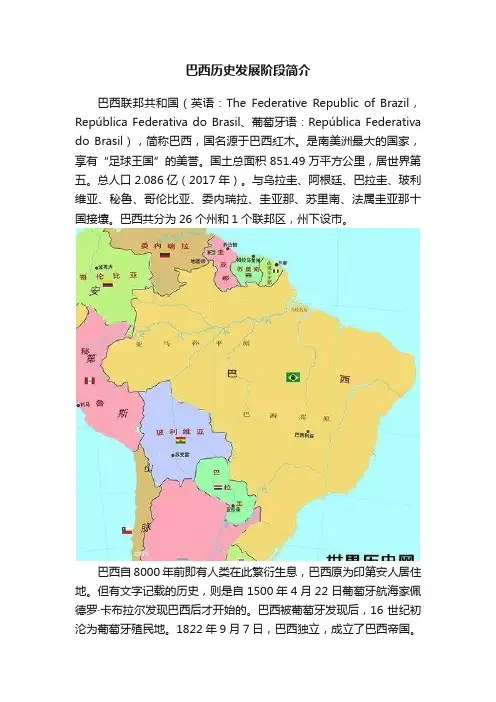
巴西历史发展阶段简介巴西联邦共和国(英语:The Federative Republic of Brazil,República Federativa do Brasil、葡萄牙语:República Federativa do Brasil),简称巴西,国名源于巴西红木。
是南美洲最大的国家,享有“足球王国”的美誉。
国土总面积851.49万平方公里,居世界第五。
总人口2.086亿(2017年)。
与乌拉圭、阿根廷、巴拉圭、玻利维亚、秘鲁、哥伦比亚、委内瑞拉、圭亚那、苏里南、法属圭亚那十国接壤。
巴西共分为26个州和1个联邦区,州下设市。
巴西自8000年前即有人类在此繁衍生息,巴西原为印第安人居住地。
但有文字记载的历史,则是自1500年4月22日葡萄牙航海家佩德罗·卡布拉尔发现巴西后才开始的。
巴西被葡萄牙发现后,16世纪初沦为葡萄牙殖民地。
1822年9月7日,巴西独立,成立了巴西帝国。
1889年,巴西爆发了军事政变,巴西帝国被推翻,巴西由君主立宪政体转为共和政体至今。
1891年建立合众国。
1967年改为现国名。
巴西的文化具有多重民族的特性,作为一个民族大融炉,有来自欧洲、非洲、亚洲等地的移民。
足球是巴西人文化生活的主流运动。
巴西拥有丰富的自然资源和完整的工业基础,国内生产总值位居南美洲第一,为世界第七大经济体。
是金砖国家之一,也是南美洲国家联盟成员。
是里约集团创始国之一,南方共同市场、20国集团成员国,不结盟运动观察员。
曾是全球发展最快的国家之一,是重要的发展中国家,航空制造业强国。
巴西曾依靠亮眼的发展速度在国际舞台上风生水起,被列为金砖五国之一,1964年,巴西经历了政变,新上台的军政府出了“进口替代战略”,就是对外建立高关税壁垒,对内依靠国家扶持工业,有赖于丰富的自然资源和欧美资金的注入,1968年到1973年巴西经济的平均增长率高达11.2%,被誉为“巴西奇迹”。
1、史前巴西佩德罗·卡布拉尔发现巴西之前,这片土地上住的是印第安人。
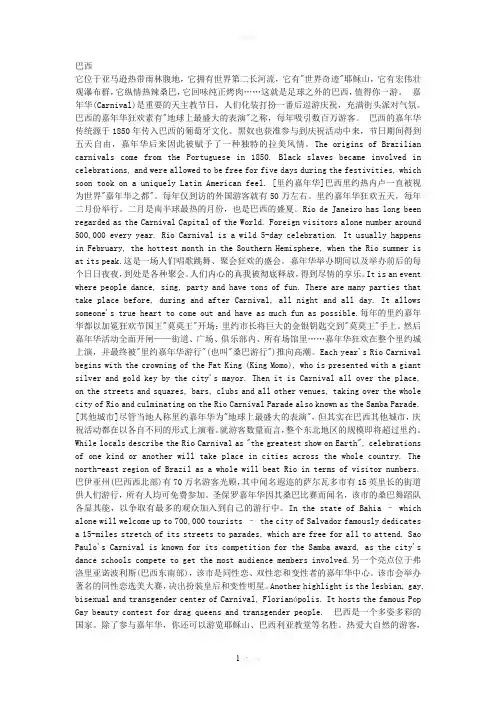
巴西它位于亚马逊热带雨林腹地,它拥有世界第二长河流,它有"世界奇迹"耶稣山,它有宏伟壮观瀑布群,它纵情热辣桑巴,它回味纯正烤肉……这就是足球之外的巴西,值得你一游。
嘉年华(Carnival)是重要的天主教节日,人们化装打扮一番后巡游庆祝,充满街头派对气氛。
巴西的嘉年华狂欢素有"地球上最盛大的表演"之称,每年吸引数百万游客。
巴西的嘉年华传统源于1850年传入巴西的葡萄牙文化。
黑奴也获准参与到庆祝活动中来,节日期间得到五天自由,嘉年华后来因此被赋予了一种独特的拉美风情。
The origins of Brazilian carnivals come from the Portuguese in 1850. Black slaves became involved in celebrations, and were allowed to be free for five days during the festivities, which soon took on a uniquely Latin American feel. [里约嘉年华]巴西里约热内卢一直被视为世界"嘉年华之都"。
每年仅到访的外国游客就有50万左右。
里约嘉年华狂欢五天,每年二月份举行。
二月是南半球最热的月份,也是巴西的盛夏。
Rio de Janeiro has long been regarded as the Carnival Capital of the World. Foreign visitors alone number around 500,000 every year. Rio Carnival is a wild 5-day celebration. It usually happens in February, the hottest month in the Southern Hemisphere, when the Rio summer is at its peak.这是一场人们唱歌跳舞、聚会狂欢的盛会。



巴西英文介绍作文下载温馨提示:该文档是我店铺精心编制而成,希望大家下载以后,能够帮助大家解决实际的问题。
文档下载后可定制随意修改,请根据实际需要进行相应的调整和使用,谢谢!并且,本店铺为大家提供各种各样类型的实用资料,如教育随笔、日记赏析、句子摘抄、古诗大全、经典美文、话题作文、工作总结、词语解析、文案摘录、其他资料等等,如想了解不同资料格式和写法,敬请关注!Download tips: This document is carefully compiled by theeditor. I hope that after you download them,they can help yousolve practical problems. The document can be customized andmodified after downloading,please adjust and use it according toactual needs, thank you!In addition, our shop provides you with various types ofpractical materials,such as educational essays, diaryappreciation,sentence excerpts,ancient poems,classic articles,topic composition,work summary,word parsing,copyexcerpts,other materials and so on,want to know different data formats andwriting methods,please pay attention!Brazil is a vibrant and diverse country located in South America. It is known for its lively culture, stunning natural beauty, and passionate people. From the bustling cities to the tranquil beaches, Brazil offers something for everyone.The cities in Brazil are a melting pot of cultures and traditions. São Paulo, for example, is a bustling metropolis that never sleeps. Its streets are filled with people from all walks of life, and the city is known forits vibrant nightlife and delicious food. Rio de Janeiro, on the other hand, is famous for its beautiful beaches and iconic landmarks such as the Christ the Redeemer statue. The city's carnival is also a major attraction, drawing tourists from all over the world.When it comes to natural beauty, Brazil is second to none. The Amazon rainforest, located in the northern part of the country, is the largest tropical rainforest in theworld. It is home to a wide variety of plant and animal species, making it a paradise for nature lovers. The Iguazu Falls, located on the border between Brazil and Argentina, is another must-visit destination. With its powerful cascades and breathtaking views, it is truly a sight to behold.Brazil is also famous for its love for sports, especially football. Brazilians are known for their passion for the game, and it is not uncommon to see people playing football in the streets or on the beaches. The country has produced some of the world's greatest football players, such as Pelé and Ronaldo. The Maracanã Stadium in Rio de Janeiro, one of the largest football stadiums in the world, is a symbol of Brazil's love for the sport.In addition to its cultural and natural attractions, Brazil is also a country of contrasts. It is home to both extreme wealth and poverty, with luxurious neighborhoods coexisting with favelas, or slums. Despite these disparities, Brazilians are known for their warm and welcoming nature. The concept of "saudade," which roughlytranslates to a deep longing or nostalgia, is deeply ingrained in Brazilian culture and reflects the country's emotional and passionate spirit.In conclusion, Brazil is a country that captivates with its vibrant culture, stunning natural beauty, and passionate people. Whether you are exploring the bustling cities, immersing yourself in the wonders of nature, or experiencing the thrill of a football match, Brazil offers a truly unforgettable experience.。
